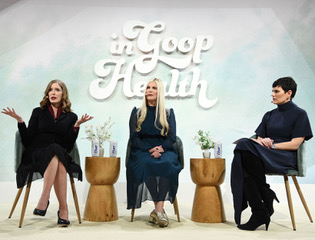
Mediums or psychics are increasingly finding a prominent place in the holistic healing milieu, especially among women, reports Lisa Held in the New York Times (March 24). The new prominence of mediums, or “intuitives” as they are called today, was on display at the recent In Goop Health Summit, run by Gwyneth Paltrow’s wellness media empire. Held cites a market analysis that found that the “psychic service industry” has grown steadily over the past five years, reaching over $2 billion in revenue in 2018 from activities such as readings and public talks. The market for such services was also suggested by a recent Pew survey that found that 62 percent of Americans believed in at least one of four spiritual practices or concepts identified as “New Age” (like astrology and reincarnation) and that 41 percent believed in psychics. Held adds that celebrities, such as Paltrow, who “have extended their brands to content (if only on their personal social-media accounts), increasingly include mediums in their self-care entourage.”
While media-savvy mediums are nothing new, their incursion into health care is drawing both followers and critics. Anthony William, a self-proclaimed “medical medium,” has started an Instagram-fueled celery juice craze which is medically supported only by messages he says he receives from a “Spirit of Compassion.” The Goop website is said to use only a minimum of messages by psychics, even if they have proven popular among users. Mediums are screened by phone, either by a Goop staffer or “trusted friend of Goop,” and their messages are labeled on the site as “fascinating but inexplicable” rather than “supported by science.” Prominent medium MaryAnn DiMarco, who authored the popular book, Believe, Ask, Act, said that she finds her clients asking less for predictions and more about “connections” that will help them make “transformations” in their lives.
The growth of the occult on the Internet has led to a rebranding of a whole range of esoteric and New Age-oriented techniques and practices that are as much driven by psychological needs as spiritual ones, according to “Internetting,” a special section on technology in the Sunday New York Times (April 7). Amanda Hess writes that the “mystical Internet has arrived. New apps like Co-Star Astrology and the Daily Hunch are part of a suite of Internet products rebranding the zodiac for the digital set. Astrological sign memes dominate Twitter. The Hoodwitch, an online retailer who sells ‘everyday magic for the modern mystic,’ has amassed over 260,000 Instagram followers for her #witchtips and beautifully staged tarot readings. Even Spencer Pratt, the archvillain of ‘The Hills,’ has reinvented himself as a crystal retailer.” Hess adds that much of this online growth of the occult is less about predicting the future and other deeply held beliefs in the supernatural than about “helping to understand ourselves.” She argues that online mysticism represents a turn to emotion “in the face of all the data that dominates the Internet. It’s a rejection of all the algorithmic, data-driven, hyper-logical, crypto-libertarian values that run so much of what we do online. In their place, it carves out room for intuition and empathy.” Hess also sees a “masculine mysticism” online, characterized by conspiracy theories, drawing connections between historical events and random images, even as the above “feminine mysticism seeks to draw spiritual connections between human beings.”
